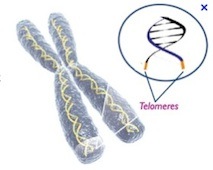The process of making a new cell in your body, starts by copying the map of how to build that cell, which is contained in package of DNA strands, called a chromosome. The chromosome divides in two, giving a new set of instructions to the new cell. At the end of the chromosome is something called a telomere, which is a bit like the hard bit at the end of a shoelace. This becomes shorter with each cell copy, until it is too short and the DNA is no longer protected. This initiates rapid ageing because cells stop dividing, and hence replacing. Meanwhile, there is an enzyme, called telemorase, which can lengthen the telomere. The more telemorase activity the slower the ageing process. For example, there’s one bacteria, called tetrahymena thermophile, that has superactive telemorase so its telomeres never shorten and it lives forever.

The length of your telomeres is a very good predictor of your healthy lifespan. Also, people who have cardiovascular disease, arthritis or vascular dementia tend to have shorter telomerase, and shorter telomeres predicts risk of cancer and cardiovascular disease death. At this point in time there’s a fair bit of ‘chicken or egg’ – do the diseases cause shortening telomeres, or are shortening telomeres resulting in the disease. But, a critical issue in ageing is what lengthens or shortens telomeres, and what promotes telemorase?
Recently I attended a lecture by Professor Elizabeth Blackburn from the University of California, who won a Nobel prize for her part in discovering all this. She updated me on all the things that lengthen or shorten telomeres, many of which we have control over.
Reduce your stress – many studies have found that people in prolonged stress situations, such as caring for a sick child or parent with dementia, lessens telemorase activity and telomere length. So do childhood traumas, chronic depression and cynicism. Those with ‘hostile’ cynicism , which sounds a bit like those people who ‘hate’ complementary medicine, have shorter telomeres. Conversely, there are some good studies that show that meditation is associated with longer telomeres.
Sleep well – The better you sleep the longer your telomeres. As far as longevity is concerned seven hours seems to be the optimal.
Exercise – The more you exercise, and the less stress you have, the longer your telomeres. In one study, those with post traumatic stress disorder who exercised didn’t have the usual telomere shortening.
Up omega 3 and vitamin DWhat it does: Helps maintain strong and healthy bones by retaining calcium. Deficiency Signs: Joint pain or stiffness, backache, tooth decay, muscle cramps, hair loss…. – One study has found that the higher your intake of omega 3 fish oils the longer your telomeres. Two studies have found that the higher your blood level of vitamin D the longer your telomeres. Both omega 3 and vitamin D are found in oily fish.
Lower your homocysteineHomocysteine is an amino acid found in the blood. Elevated levels of homocysteine have been associated with narrowing and hardening of the arteries, an increased… level with more B12 and folate – The higher your blood levels of these two vitamins, and the lower your homocysteine level, the longer your telomeres are likely to be. These vitamins are well known to lower homocysteine – and the older you get the more B12 you need as absorption can get a lot worse.
Those who have been following my health advice over the years, or read Ten Secrets of Healthy Ageing, will be heartened to see that the advice I’ve been giving is now being shown to affect your healthy lifespan at a really fundamental level. When I first came into this field the predominant concept was that you needed enough nutrients for enzymes to work, but now it is clear that optimising your intake of nutrients not only turns on and off the right genes, but may actually lengthen your healthy life by allowing more cell divisions to occur before your telomeres fray at the edges.

Comments
Join the Conversation on our Facebook Page